Hey Speech Friends! It’s day 3 of fluency week! Today’s post is focusing on a few apps to target fluency disorders. First we have three guest contributors today discussing how they use apps. I will also share the apps I have experience with! Fluency Rater  I use Fluency Rater (iPhone only) mostly for initial fluency assessments. The layout is simple and really easy to use, it quickly and easily calculates syllables per minute (SPM) and percentage of stuttered syllables (%SS) and the best part is that at only $10.49 (AUD) it is a bargain compared to other products available for rating fluency. Fluency Rater is designed to be used on the iPhone but it is also compatible with the iPad (you just have to stretch it out).
I use Fluency Rater (iPhone only) mostly for initial fluency assessments. The layout is simple and really easy to use, it quickly and easily calculates syllables per minute (SPM) and percentage of stuttered syllables (%SS) and the best part is that at only $10.49 (AUD) it is a bargain compared to other products available for rating fluency. Fluency Rater is designed to be used on the iPhone but it is also compatible with the iPad (you just have to stretch it out). 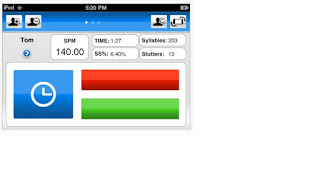 Once you have added a new client you can use the rating area to rate speech (no earth shattering revelations here!) The rating screen is made up of a ‘rating area’ and a toolbar across the top. The timer starts as soon as you begin counting syllables. All you do is tap the green bar (syllable button) to record a fluent syllable and tap the red bar (error button) to record a dysfluent syllable. Tap the ‘clock’ button to stop the timer when the child is not talking. If the timer is paused the green ‘syllable button’ will start the timer again. The toolbar can be used to add a new client, delete a client, or refresh the statistics of the current client. The only problem I have found with this app is that you can’t save results or email them to yourself-which does mean you have to remember to write them down or they are gone forever! My name is Lauren and I am a speech pathologist working in a private practice in Adelaide, South Australia. I work across the board in both early intervention and in a number of schools so I see kids from 3 years up to 13 years of age. You can contact me onlauren@talkingmatters.com.au, go to our website www.talkingmatters.com.au or like Talking Matters on facebook. Skype(tm)/Video Chat Today, there are many advantages to using technology in fluency therapy. There are so many different tools we can use as therapist. One such tool is by using a video chat application.
Once you have added a new client you can use the rating area to rate speech (no earth shattering revelations here!) The rating screen is made up of a ‘rating area’ and a toolbar across the top. The timer starts as soon as you begin counting syllables. All you do is tap the green bar (syllable button) to record a fluent syllable and tap the red bar (error button) to record a dysfluent syllable. Tap the ‘clock’ button to stop the timer when the child is not talking. If the timer is paused the green ‘syllable button’ will start the timer again. The toolbar can be used to add a new client, delete a client, or refresh the statistics of the current client. The only problem I have found with this app is that you can’t save results or email them to yourself-which does mean you have to remember to write them down or they are gone forever! My name is Lauren and I am a speech pathologist working in a private practice in Adelaide, South Australia. I work across the board in both early intervention and in a number of schools so I see kids from 3 years up to 13 years of age. You can contact me onlauren@talkingmatters.com.au, go to our website www.talkingmatters.com.au or like Talking Matters on facebook. Skype(tm)/Video Chat Today, there are many advantages to using technology in fluency therapy. There are so many different tools we can use as therapist. One such tool is by using a video chat application.
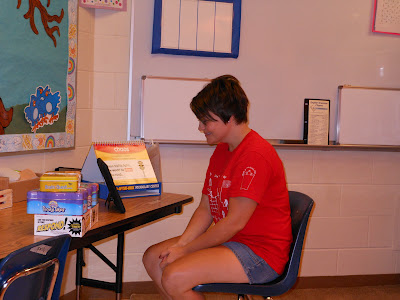 Many people working on their speech fluency try to avoid speaking on the phone, for fear they might be dysfluent. In some cases, the person may feel they are more fluent in person, but over the phone, “all bets are off”. To address this fear with one particular student (I will call him Joe), I used a video chat application (an app search for video chat will give you many to choose from). Joe was very comfortable during face to face interactions, approximately 80% to 90% fluent during his therapy time. However, Joe expressed his fear of talking to his girlfriend on the phone. We explored deeper and found that Joe really tried to avoid answering the phone, as well as making phone calls. First, Joe and I did a trial run, with him calling my office to speak with me. Immediately, I recognized that Joe was not comfortable. His fluency decreased from about 85% to 60%. He had more prolongations, repetitions, and tried to use as few words as possible. Joe’s confidence was not as great as it had been a few hours before. With this in mind, Joe and I decided to try something else.
Many people working on their speech fluency try to avoid speaking on the phone, for fear they might be dysfluent. In some cases, the person may feel they are more fluent in person, but over the phone, “all bets are off”. To address this fear with one particular student (I will call him Joe), I used a video chat application (an app search for video chat will give you many to choose from). Joe was very comfortable during face to face interactions, approximately 80% to 90% fluent during his therapy time. However, Joe expressed his fear of talking to his girlfriend on the phone. We explored deeper and found that Joe really tried to avoid answering the phone, as well as making phone calls. First, Joe and I did a trial run, with him calling my office to speak with me. Immediately, I recognized that Joe was not comfortable. His fluency decreased from about 85% to 60%. He had more prolongations, repetitions, and tried to use as few words as possible. Joe’s confidence was not as great as it had been a few hours before. With this in mind, Joe and I decided to try something else. 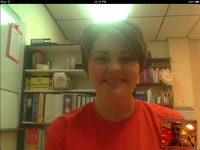 I borrowed another iPad from a co-worker and set up video chat in 2 separate rooms, with Joe in one room and myself in another. This application allowed Joe to still see me while we talked, but allowed us to be in separate places, like a phone conversation. After Joe was more comfortable with using video chat, I took away the picture and used only the voice portion to simulate a phone conversation. While Joe’s fluency decreased slightly initially, he was able to use strategies to increase his fluency after a reminder to picture the person (me) at the other end. After using the video chat, Joe commented on how he felt it helped and requested to use it again.
I borrowed another iPad from a co-worker and set up video chat in 2 separate rooms, with Joe in one room and myself in another. This application allowed Joe to still see me while we talked, but allowed us to be in separate places, like a phone conversation. After Joe was more comfortable with using video chat, I took away the picture and used only the voice portion to simulate a phone conversation. While Joe’s fluency decreased slightly initially, he was able to use strategies to increase his fluency after a reminder to picture the person (me) at the other end. After using the video chat, Joe commented on how he felt it helped and requested to use it again.
Jenni Lund is a school based Speech/Language Pathologist working with students from 2nd through 12th grade in Wisconsin. I graduated from University of Wisconsin-River Falls in 2008 and enjoy researching and incorporating technology into therapy. I love seeing the results that technology can bring. I only wish I was more creative and could make more of my own therapy materials! Disfluency Index Counter 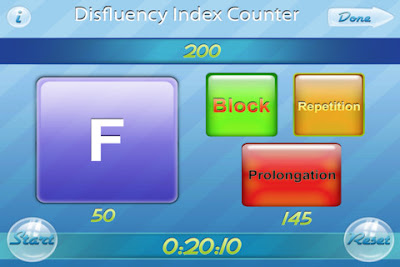 The Disfluency Index Counter is an app I use a ton! It’s so much easier than trying to keep track of syllables uttered vs syllables stuttered. Not only does it keep track for you, it keeps percentages and they are email-able. The thing I love most is that I can just keep my iPad in my lap and tap away, and for the most part the kids barely recognize that I’m doing anything whatsoever! Highly recommended if you see many fluency kids. Lauren Nykamp, M.A., CCC-SLP is a Speech Pathologist in Grand Rapids, MI. She has spent the past year in the school system, grades K-12, though I am currently considering a transfer to the pediatric/adult medical area. Super big thanks to Lauren, Jenni and Lauren! I love hearing the opinion of other SLP’s! Here’s a peek of what I have been using! Tap Metronome
The Disfluency Index Counter is an app I use a ton! It’s so much easier than trying to keep track of syllables uttered vs syllables stuttered. Not only does it keep track for you, it keeps percentages and they are email-able. The thing I love most is that I can just keep my iPad in my lap and tap away, and for the most part the kids barely recognize that I’m doing anything whatsoever! Highly recommended if you see many fluency kids. Lauren Nykamp, M.A., CCC-SLP is a Speech Pathologist in Grand Rapids, MI. She has spent the past year in the school system, grades K-12, though I am currently considering a transfer to the pediatric/adult medical area. Super big thanks to Lauren, Jenni and Lauren! I love hearing the opinion of other SLP’s! Here’s a peek of what I have been using! Tap Metronome  Rhythm and speech fluency have been the subject of some interesting research in the fluency field. I use the metronome for slowing the pace of my students. When we talk about the rate of speech it’s hard to realize how fast we really speak! Above is a screen shot from the FREE app! Speech4Good
Rhythm and speech fluency have been the subject of some interesting research in the fluency field. I use the metronome for slowing the pace of my students. When we talk about the rate of speech it’s hard to realize how fast we really speak! Above is a screen shot from the FREE app! Speech4Good 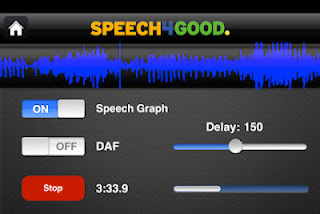 The Speech4Good app is one I use for Delayed Auditory Feedback! I wrote an entire review of this app back in March. Read the entire review for more information! Disfluency Index Counter
The Speech4Good app is one I use for Delayed Auditory Feedback! I wrote an entire review of this app back in March. Read the entire review for more information! Disfluency Index Counter  Like Lauren, the Disfluency Index Counter is how I track data for syllables stuttered. My personal method is to repeat what the child says in my own head, which allows me to tap as I ‘repeat’ each syllable. I can email myself the data to print at the end of the sessions. If you’re interested in fluency apps, a quick iTunes search for ‘speech fluency’ apps with reveal a few more options not listed above. Do you use these apps? Have you used something else? Leave a comment and let us know!
Like Lauren, the Disfluency Index Counter is how I track data for syllables stuttered. My personal method is to repeat what the child says in my own head, which allows me to tap as I ‘repeat’ each syllable. I can email myself the data to print at the end of the sessions. If you’re interested in fluency apps, a quick iTunes search for ‘speech fluency’ apps with reveal a few more options not listed above. Do you use these apps? Have you used something else? Leave a comment and let us know!
Join the SRN newsletter!

I'm so glad you stopped by! If you'd like to keep up with the newest posts and get exclusive free downloads, please sign up for the newsletter! Your first freebie is ready as soon as you subscribe and confirm your email!

Skype!! Genius!!
Loving fluency week, by the way 🙂 Thanks for sharing!
Let’s Talk Speech Therapy
Rachel